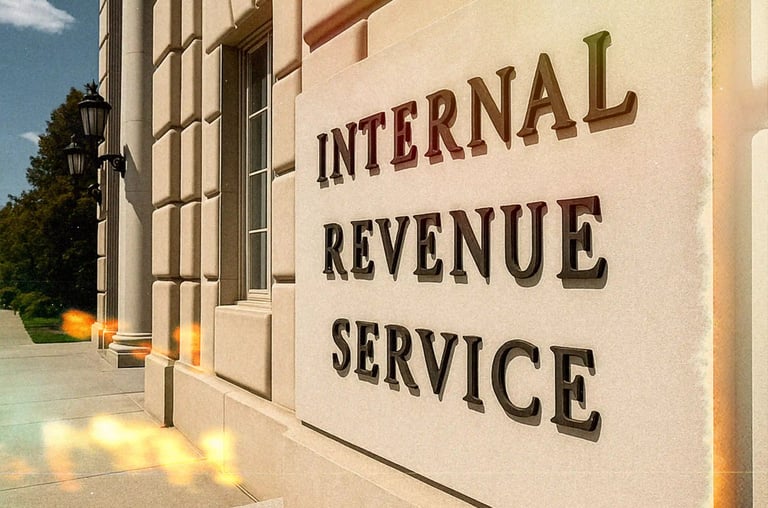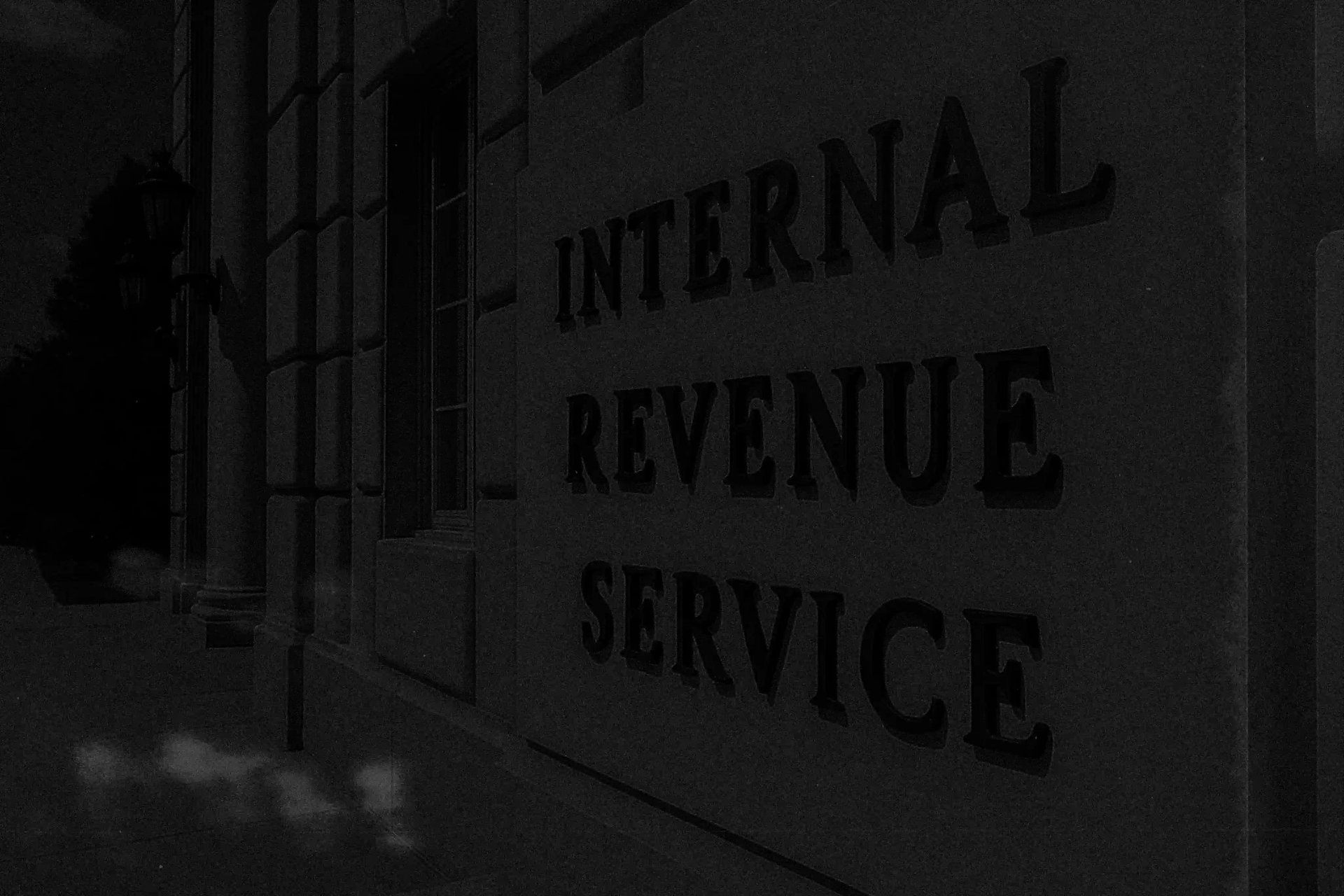
Easily Understand Your Finances With The Financial Health Check Template Today
What is the IRS?
Learn what the IRS (Internal Revenue Service) is, what they do, the difference between the IRS, the SEC (Securities and Exchange Commission), and the Department of the Treasury.
ECONOMYTAXHOMEPAGE - FEATURES - ROW 2
David Kindness, CPA
6/4/2025



What is the IRS?
Published on June 3, 2025
Why you can trust Your Creative CPA
Our content is written and edited by industry experts who are creative entrepreneurs just like you. Learn more. We're human-first.
When it comes to taxes and financial regulations in the United States, one three-letter agency stands above the rest: the Internal Revenue Service (IRS). Whether you're filing taxes, dealing with audits, or managing business finances, understanding the IRS is crucial. But what exactly is the IRS, and how does it function alongside other key financial institutions like the SEC, Department of Revenue, and the Federal Reserve?
In this article, we’ll break down what the IRS does, why it exists, and how it differs from other major financial regulators. By the end, you’ll have a clear understanding of how the IRS impacts the economy and the US financial landscape.
Fast Facts About the IRS
The Internal Revenue Service (IRS) is responsible for tax collection and enforcement of federal tax laws.
The IRS processes tax returns, conducts tax audits, handles tax disputes, issues refunds, and more.
The IRS was originally founded in 1862, but it's modern form was established in 1913.
The IRS's parent agency is U.S. Department of the Treasury (DOT).
What is the IRS?
The IRS (Internal Revenue Service) is the U.S. federal agency responsible for ensuring compliance with tax codes, processing tax returns, and issuing refunds. It oversees tax laws and tax collection for individuals, businesses, trusts, estates, and nonprofits. They also collect payroll, unemployment, social security, and medicare taxes.
The IRS's key responsibilities include...
Tax Collection: The IRS collects trillions in federal taxes annually.
Tax Return Processing: Manages millions of individual and business tax filings.
Audits & Enforcement: Investigates discrepancies and enforces tax laws.
Taxpayer Assistance: Provides resources for filing, payment plans, and disputes.
What Does the IRS Do?
The IRS plays significant role in collecting taxes and funding government operations, from infrastructure to social programs. Here’s a deeper look at its functions:
Tax Administration
Processes Form 1040 (individuals), Form 1120 (corporations), Form 1065 (partnerships), Form 1041 (trusts), Form 706 (estates), Form 709 (gifts), payroll taxes, and other filings.
Manages electronic filing (e-file) and paper submissions.
Accepts payments digitally or by check.
Collects taxes from paychecks and estimated tax payments.
Tax Enforcement & Compliance
The IRS compares tax return submissions to independent documentation, such as Form W-2s, Form 1099s, Form 1099-DIV, Form 1099-INT, and more.
Sends letters and conducts inquiries and audits to verify tax accuracy.
Pursues tax evasion cases and imposes penalties and potential legal repercussions.
Tax Refunds & Credits
Issues tax refunds for overpayments.
Applies refunds to future year taxes (if selected by the taxpayer)
Administers tax credits and tax deductions like the Earned Income Tax Credit (EITC), the the business use of home deduction, and more.
Tax Regulation & Guidance
Publishes tax codes, rules, and updates.
Provides taxpayer education through publications and online tools.
Connects taxpayers to free and paid tax filing options, plus free tax assistance for low income taxpayers.
A Brief History of the IRS
1862: Created during the Civil War to fund war efforts.
1913: Permanently established with the 16th Amendment, putting the first federal income tax into effect.
1950s-60s: Modernized with computer systems for processing.
1998: Restructured to improve taxpayer services and enforcement.
Today: Continues to manage taxes and handle payments.

The IRS (Internal Revenue Service) is the US federal agency responsible for ensuring compliance with tax codes, processing tax returns, and issuing refunds.



What is the SEC?
While the IRS handles taxes, the Securities and Exchange Commission (SEC) regulates financial markets and securities. While the IRS focuses on tax collection, enforces tax laws, and oversees individuals & businesses, the SEC focuses on investor protection & market fairness, enforces securities laws, and oversees public companies & stock exchanges
What is the Department of the Treasury?
The US Department of the Treasury (DOT) manages America's finances, overseeing federal revenue, economic policy, and currency production. It supervises the IRS, issues government debt, and enforces financial regulations. As the backbone of U.S. fiscal operations, it ensures economic stability and funds national priorities.
What is the Fed?
The Federal Reserve (the Fed) is the central banking system of the U.S., separate from the IRS. The Federal Reserve manages monetary policy and controls interest rates. They also manage the money supply by printing US dollars, which is the sole source of monetary inflation. Take a look at our 'What is the Federal Reserve?' article to learn more - it's crazier than you think.
What is the Department of Revenue?
Many states have their own Department of Revenue (DOR), which functions similarly to the IRS, but at the state level. State DORs are responsible for collecting state income taxes, sales taxes, and property taxes. Similarly, they manage state tax laws, refunds, and audits.
Conclusion
The IRS is the backbone of US tax system, ensuring government funding through tax collection and enforcement. While it operates alongside agencies like the SEC, DOT, DOR, and the Fed, its primary focus is federal taxation.
Understanding the role of the IRS can help you navigate obligations, avoid penalties, and maximize refunds. Similarly, knowledge is power - the IRS only has jurisdiction over taxes, so they shouldn't be bothering you over anything else. Whether you're an individual or a business, staying informed about IRS policies is key to financial compliance.
Take a look at our financial resources for creatives for useful tools to help you manage taxes, save money, and grow your business.
Frequently Asked Questions (FAQs)
What is the difference between the IRS and the Department of Revenue?
The IRS handles federal taxes like income, FICA, and FUTA taxes, while state Departments of Revenue manage state-level taxes like income, sales, and property taxes.
Does the IRS audit everyone?
No, the IRS uses risk-based algorithms to select tax returns for audits, focusing on discrepancies or high-income earners.
Can the IRS seize your assets?
Yes, in cases of unpaid taxes or fraud, the IRS can levy bank accounts, wages, or property to pay taxes due. However, if you stay on top of taxes, then this won't be an issue. If you're curious about estimated taxes, check out our guide to estimated taxes.
Who controls the IRS?
The IRS operates under the U.S. Department of the Treasury and is overseen by Congress.
How does the IRS compare to the SEC?
The IRS enforces tax laws, while the SEC regulates stock markets and protects investors from fraud.
Disclaimer: the information provided in this article is for educational purposes only and does not constitute tax, accounting, investing, legal, or financial advice. The information in this article does not take into account your unique financial or business situation or goals, and YCCPA cannot be responsible for reader's financial decision-making. YCCPA's goal is to educate and support you on your creative business journey.
Written by David Kindness, CPA
David is a CPA (Certified Public Accountant) and professional photographer, videographer, and designer based in San Diego, California. Learn more.
Supported by Ads
Your Creative CPA is supported by the ads you may see in our articles and guides. These ads help us serve creatives like you.







Created by David Kindness
© 2025 Your Creative CPA | Terms
type1wild.com partner
Exclusive guides and tools for creatives, right to your inbox.









